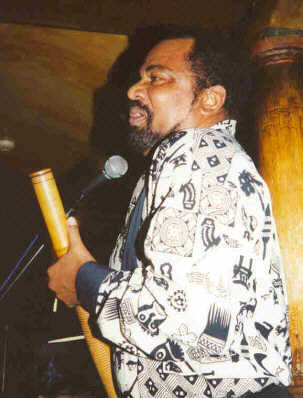| Bongo
Kuenda was born Barcela de Carvalho and he comes from Angola.
He grew up in the shanty towns outside Luanda and, as well as
absorbing the sounds of modern Angolan music, he became involved
in the fight for independence from the Portuguese. He had to
flee to exile, first to Holland and then France. At one time
he was a professional footballer for the club Benfica as well
as a 400-metre champion runner and in this capacity was able
to travel to different countries.
While living
in Paris in the 1970s Bonga recorded many excellent albums and
his songs feature on numerous compilations including the track
'Diarabi' on Manu Dibango's Wakafrika. He was the first
to sing 'Sodade', now made famous by Cesaria Evora.
Bonga sings
in calao, a language that mixes Portuguese and Kimbundu. As
well as singing in his very distinctive rather rough voice he
plays the dizanka, an Angolan bamboo strummer and occasionally
the puita, a fairly rarely heard friction drum. His songs have
Brazilian influences as well as indigenous Angolan Semba sounds
and he has worked with musicians from several different countries.
He stayed on in Paris and Lisbon after Angola's independence
and was critical of the post-colonial |

set-up
in
his home
country. Recordings
Bonga has made
include
Roca
de Jindugo, Paz
em Angola, Swinga, Swinga:The Voice of Angola 102% Live,
Mulemba Xangola and O Melhor. In 2003 Bonga recorded
a great new album, Kaxexe. It contains both pleading
heartfelt melodies and typical Angolan beats.
You can be
sure Bonga is living up to the meaning of his stage name: "he
who searches" or "he who goes ahead". His commitment to beautiful
music and an end to strife in Angola are absolute. The photo
on this page was taken while Bonga and his band were at Momo's
in London in 2002. If you get a chance to see him playing live
don't miss it! |